English
head of department: mrs barrett-porter
English Department Curriculum Intent: Ethos and Aims
As a Department, we strongly believe in:
Inspiring a love of English
Providing structure, routines and normalcy
Encouraging and supporting all students to achieve
Fostering confidence and success, academically and socially
Forging positive relationship between staff and students
Expecting excellence in attitudes to learning, presentation and behaviour
Reviewing, refining and renewing all that we do
Being innovative and forward-thinking
Respect for all
Empathy
We believe this leads to a safe and productive space in which students can flourish both academically and socially.
What this looks like in the classroom:
- Engaged and curious students
- Collaborative learning
- Discussion
- Written progress
- Happy learning environment
Our Intent
Students will develop an appreciation and awareness of the impact of literature in our society, develop into confident and independent readers, and gain the skills to become independent thinkers.
We will empower students to develop confidence to:
- apply literary and linguistic concepts
- retrieve and connect knowledge
- zoom in and comment on a writer’s language choices
- question and evaluate the writer’s purpose
- create a sustained argument using a range of textual evidence to support ideas
- write accurately, coherently and concisely
- confidently adapt their writing to suit a range of audiences and purposes
- work independently and collaboratively
Our Rationale for Sequencing Students Learning
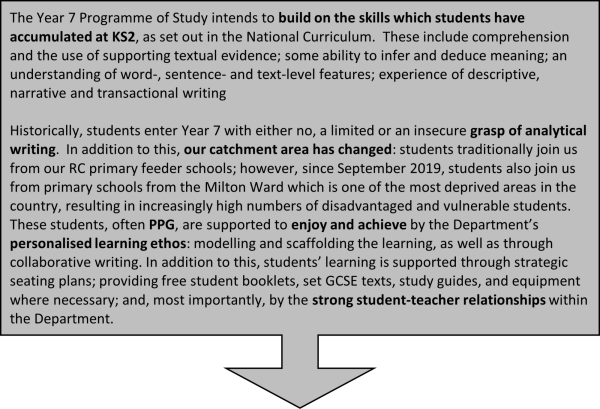
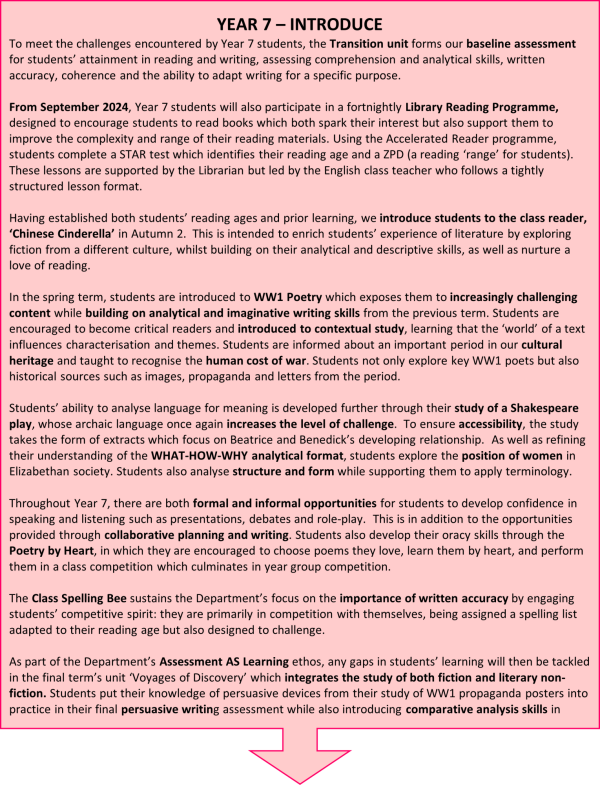
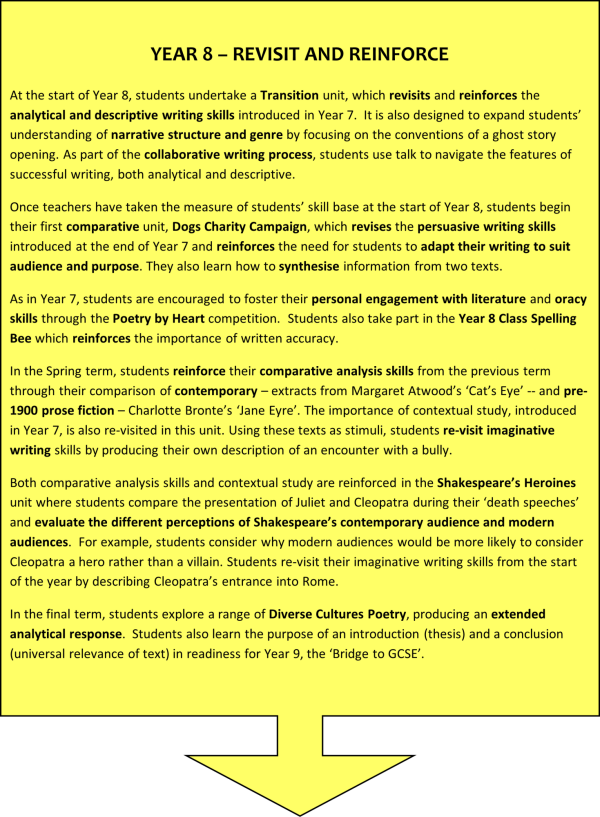
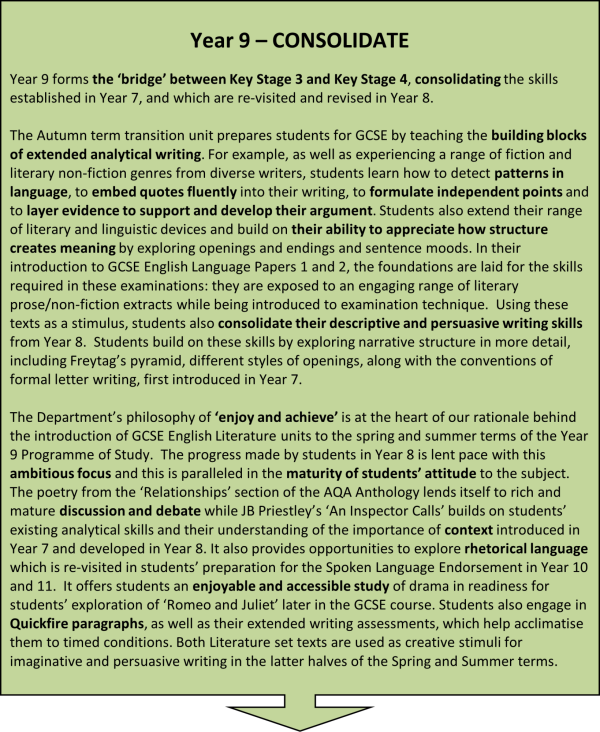
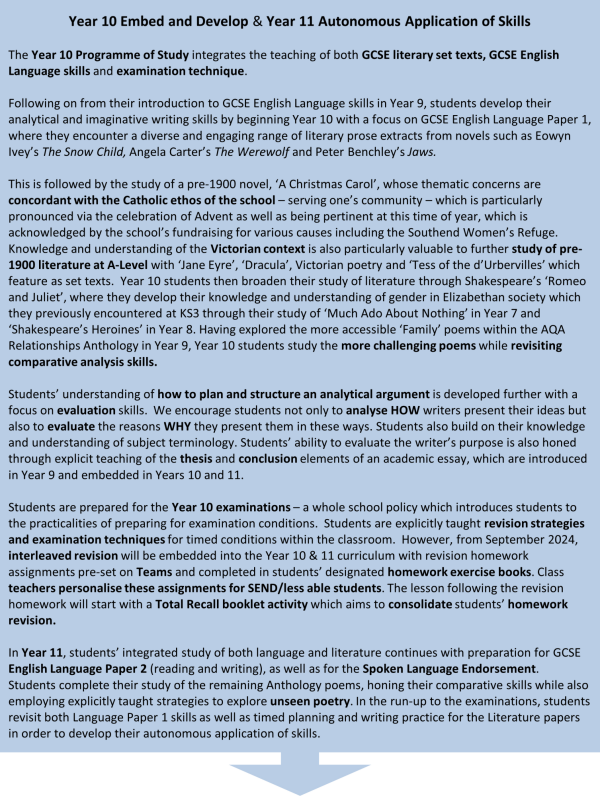
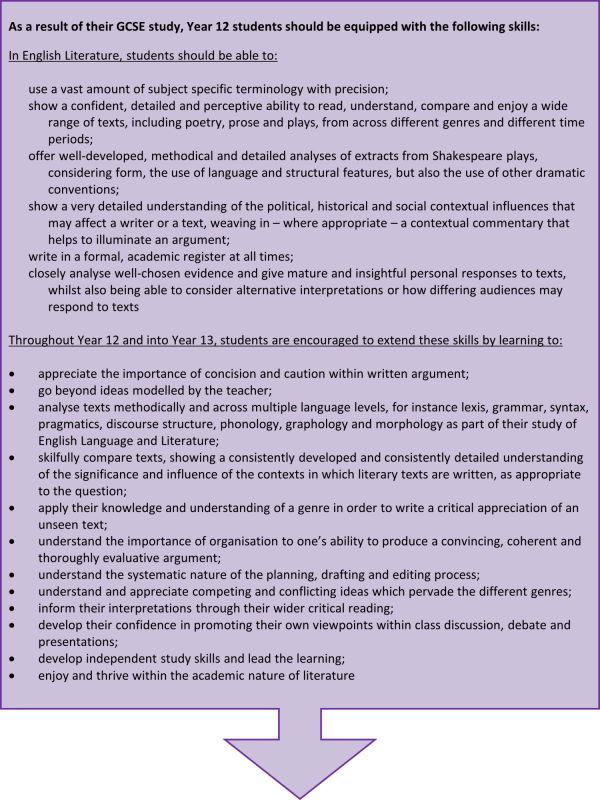
How is the curriculum implemented?
As an English department, we believe in making the learning accessible for all, endeavouring that every child’s experience is one of quality, enjoyment and aspiration. This is particularly pertinent since students are taught in mixed-ability groups. These groups are loosely streamed at GCSE with a lower-ability group and two groups more able groups on either side of the bands.
To achieve this, learning is structured around half-termly units which culminate in standard assessment tasks. These are followed by an ‘Acting on Feedback’ lesson which seeks to reinforce the learning. Both of these elements are in tune with the Department’s ‘assessment as learning’ philosophy which believes in reviewing, refining and reinforcing students’ knowledge, understanding and skills.
In addition, this consistency of approach enables monitoring of the learning experience through learning walks and moderation, as well as providing opportunities for sharing practice, all of which enables us as teachers to understand and support the needs of our students.
The programmes of study are enhanced by schemes of work, lesson PowerPoints and topic booklets. These all embed the Department’s teaching and learning principles:
- Silent Retrieval – all key stages
- Total Recall and interleaved revision – key stage 4
- Modelling
- Scaffolding
- Collaborative writing
- Promoting independence
- Review, revisit, and repeat!
Collaborative curriculum planning lies at the heart of what we do in as a Department and every year we review, refine and renew particular areas of the subject as a result of the changing needs of our students, changes to the curriculum and in response to a changing society.
How do we know that the learning has impact?
We know our curriculum is working in the English Department through the engagement of students observed throughout the school and validated through the student focus groups. The quality of teaching and learning in English has been praised during learning walks by both external and internal observers. Despite the challenge facing A-level numbers in English nationally, our class numbers are reasonably healthy although the popularity of a particular course varies from year to year. Other essay-based subjects, such as Psychology, have commented on how students are better equipped to write evaluatively.
While students do go on to study English at university, it is more the case that many students choose to study A-Level English because of its transferable skills which support a range of other degree courses - especially Law, Psychology, Criminology, Classics and other Arts degrees. We also run GCSE re-sits to support those Year 12 and Year 13 students who require a grade 4 or 5 at GCSE as part of their degree course criteria.
In the last 5 years, the English department has been amongst the top 5% nationally for value-added scores. Almost consistently, student progress improves year-on-year. More importantly, students frequently express their enjoyment of the subject and their appreciation of what they have gained from English that they can take out into the world.
GCSE National statistics - Cumulative by grade

GCSE English Language Key Statistics - June 2024

GCSE English Literature Key Statistics - June 2024

